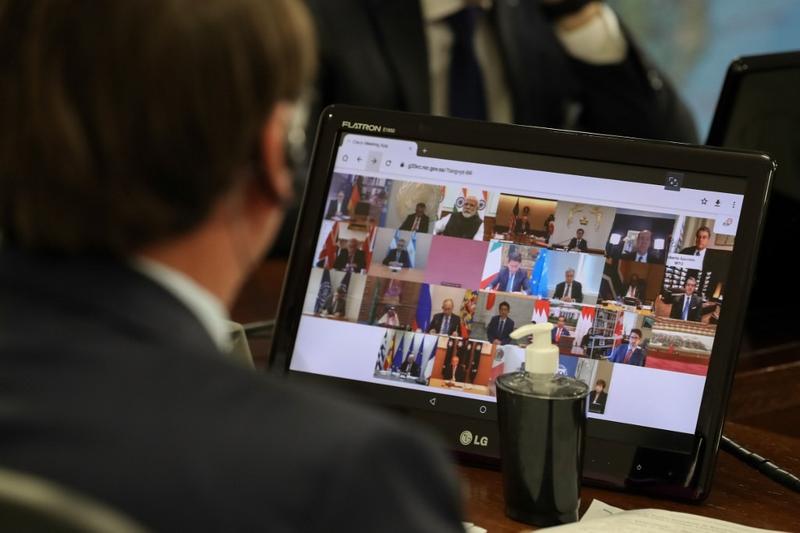 Handout photo released by Brazilian Presidency showing Brazilian President Jair Bolsonaro attending the G20's video conference meeting in Brasilia on March 26, 2020. (PHOTO / AFP)
Handout photo released by Brazilian Presidency showing Brazilian President Jair Bolsonaro attending the G20's video conference meeting in Brasilia on March 26, 2020. (PHOTO / AFP)
BEIJING — At this trying time when the world is craving stronger global solidarity and cooperation, the Group of 20 (G20) has stepped up to the plate, seeking to take the lead again.
The message at the extraordinary G20 leaders' summit on Thursday has been an unmistakable one of unity and action as the leaders of the world's major economies have pledged an array of decisive multilateral responses, including a plan to inject over US$5 trillion into the global economy, to fight off the raging coronavirus pandemic and the hovering prospect of a full-blown global economic recession.
The group had before championed the cause of helping put the global economy back on the track of recovery in the wake of the 2008 financial crisis. But with both the health of humanity and the future prosperity of the world economy under threat, the job this time will be indisputably harder.
Against this backdrop, the wider world needs to join the G20 members and take substantial actions so as to win this epic battle.
The fact that China has already effectively managed to control the epidemic at home has proved that this previously unknown disease is containable and curable
ALSO READ: COVID-19: G20 leaders to inject US$5t into global economy
A paramount task is to shore up confidence, instead of letting panic reign.
The human race has been no stranger to highly lethal infectious diseases. Over the centuries, mankind has always managed to pull through when a deadly pathogen hit, and emerged much stronger and more experienced.
Also, the fact that China has already effectively managed to control the epidemic at home has proved that this previously unknown disease is containable and curable.
Thus if the international community can choose to come together and fight as one, victory will be within grasp.
To do that, governments around the world should join forces and give global cooperation a strong boost. Solidarity as demonstrated by the G20, which accounts for over 80 percent of the gross world product and about two-thirds of the entire human population, has been so far the most powerful weapon to end the crisis.
Thursday's meeting has presented a comprehensive guideline to promote cooperation to share critical information, ensure adequate financing, expand manufacturing capacity to catch up with the rising demand in urgently needed medical supplies, and build a global network of control and treatment. It is time to translate these proposals into actions.
The victory over the virus in one country is never a guarantee that the invisible microbe will not stage a comeback from other corners of the globe.
Therefore, the international community should also get ready to help developing and underdeveloped countries, notably those in Africa and small island states with rather vulnerable health systems and economies, to overcome the challenge.
In this process, major international organizations like the United Nations and the World Health Organization (WHO) should play their uniquely important parts.
One other major mission for countries worldwide is to step up policy coordination, particularly in the economic and trade sectors.
READ MORE: Xi calls on G20 countries to join forces to fend off recession
Financial chiefs, central bankers and trade regulators across the world should join their G20 counterparts in coordinating their stimulus packages like tax cuts, investment plans and loan guarantees, and facilitating global free trade so as to prop up struggling enterprises, steady the global supply chains, inject elements of certainty into global markets, and lay a solid foundation for a robust rebound when the pandemic is defeated.
Last but not least, countries worldwide need to trust each other, and stop politicizing the pandemic, as it would only encourage inaction and division, harm solidarity and put global cooperation at risk.
In their joint statement released after the summit, the G20 leaders vowed "to do whatever it takes" to overcome this common threat to humanity. It is a call of duty not just to the world's top 20 economies, but to the entire global community. It is time to put everyone's hand to the plough.


